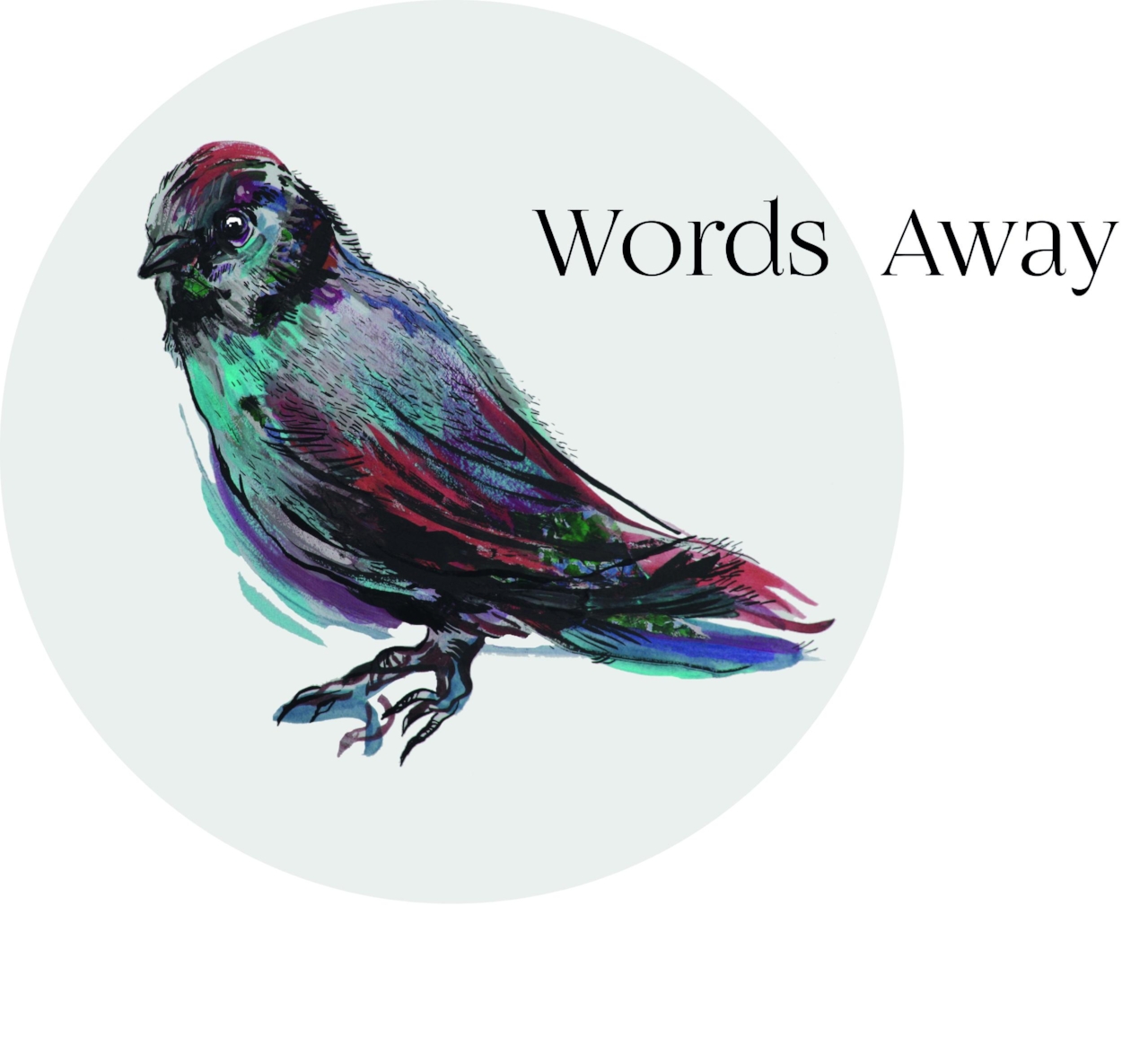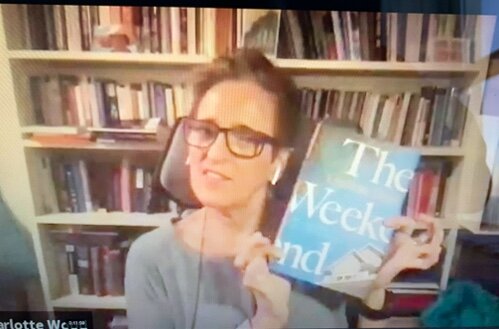I fired up Zoom on a Saturday morning this month, rather than the usual Monday evening slot, welcoming a global audience and introducing Australian author Charlotte Wood who was at home in Sydney. In an alternate universe Charlotte was meant to be visiting London for the UK publication of The Weekend and had kindly promised to be a Words Away guest for a summer salon. Alas Corona put a halt to everyone’s plans for 2020. While it was not quite the same as meeting in person it was still exciting to have the chance to hear Charlotte talk candidly about her writing life and to learn how she approaches developing character and place.
Charlotte Wood via Zoom!
Charlotte said she’d always “wanted to be a writer without knowing it.” She loved reading as a kid and was top of the English class. She grew up in a country town and worked on the local paper. Her father sadly died when she was young which meant she went to university a bit later in life. She took creative writing classes which she loved but said she only began to take her writing seriously aged twenty-nine following the death of her mother. She decided then to commit to her writing and finish something. She took community writing classes, made lasting friendships there and aged thirty-four she published her first novel. She’s since gone on to publish six novels and two works of non-fiction and has been awarded many of Australia’s top literary prizes.
We talked about how Charlotte develops an idea and she said it tends to start with something instinctive, “usually an area of interest that troubles me.” With The Weekend for example, it was a question about friendship. “How do you sustain it over time? How does it work when you’ve known each other so long you’ve basically become a family. Can it remain porous enough to sustain a friendship…or do you harden up or become too tough to have a good friendship ?” She said it was also a cautionary self-portrait! At fifty-five she said she can sometimes feel herself hardening up and wondered what am I going to be like when I’m seventy five?
Beginning a new project can be an anxious-making, chaotic time. While it might be a slow process she said she’s used to it now and it doesn’t freak her out! “The good thing about writing a few novels is that you recognise the pattern and it doesn’t scare you anymore.” Two years into writing The Weekend she’d generated lots of material but she still hadn’t worked out a key problem to do with the setting. She became fearful that novel wasn’t working, so she took a break for six months. When she came back to the manuscript she’d worked out the answer. This gave a driving purpose to the narrative and she knew what to throw out and what to keep.
Here’s the UK edition of The Weekend
Charlotte never abandons things, saying that she has one idea every four years and once she kicks off she sticks to it out of desperation! She’s always interested in what people call a first draft. A first draft for Charlotte is when she has a beginning, a bit of a middle and an end. She’ll know all the major events that have happened and writes towards the ending. Her first and second drafts are a process of discovery as she finds out who are the people in the story, where are they, why they’re all together and what’s stopping them from having what they want. Charlotte bravely admitted that she finds writing hard and difficult - the first draft is like blindly groping in the dark with lots of stumbling around and feeling unsure about what she’s writing. She’ll write the second draft for herself but by the third draft she’ll start to have a better idea of what the book is about. With The Weekend for example, she knew from the beginning that it was a book about getting older and friendship. That was the big picture but two drafts in she discovered it’s also about the illusions we can have about ourselves. Even as we think, “I’m getting older, I know myself now,” Charlotte discovered in the writing that actually the characters didn’t know themselves at all and therein lay the poignancy of the story - it’s through their friends that that they each reveal themselves to each other.
After the second draft Charlotte said it’s time to get rigorous and cut out anything boring. She’ll pay attention to the pacing and think about the reader. She’ll be looking at where the story is lagging or trailing off. She thinks of the narrative as threads that need to be pulled tight all the way through. Every scene has to have a reason for being there and every character has to have a purpose. One of the joys of zoom is that Charlotte was speaking to us from her study at home and she could show us her white board complete with her checklist used to fine-tune The Weekend. Across the top of the board she’d marked column headings; Scene, Point of View, Incident, Source of Tension and Other. Then down the side she’d listed each day; Day 1, Day 2 & Day 3 (the action of novel takes place over three days). She said by this stage she becomes quite mechanical in her approach - every scene has to contain one of those things and if it can’t hit those notes then it’s cut.
The white board!
Using tension as a guiding principal is a good way to drive your narrative. Here’s Charlotte’s method:
Look at the constraints of the place/setting.
Work out how your characters spend their days and ask where does the pressure come from?
Think about the rhythms of their day (food, shitting, working, sleeping etc).
What are the interactions between your characters?
Identify the tension in every single scene.
Find the conflict in the way in which the characters see themselves versus the way others see them.
Find small points of tension in the everyday - it can be something tiny but then stretch it out, open it up and add to it. Pile these moments in and if just three little things go wrong it gets the pages turning.
As a literary writer Charlotte’s interested in really small moments between people. To keep the pages turning you need physical things to happen - things in the world that you can touch, see and hear. Create little ripples of small drama, then stack them together and it can become useful for you.
Place, the world of a novel, is really important to Charlotte and is one of the first things she needs to establish before she can progress. It can take a while before she works it all out. Place is a container for everything that happens in the story. If she has a sense of the place it gives her something to hang on to at the beginning of the writing process. Place has to feel material and real. She’ll go for a walk, record sounds, take photos and explore really sensory stuff. Knowing where the story is set sustains her when she has no real idea of what else she’s doing!
The conversation ventured to Charlotte’s experience as the first writer in residence at the Charles Perkins Centre, University of Sydney, a science and health research centre that facilitates a multidisciplinary approach to chronic disease. The centre is named in honour of Charles Perkins, a famous Aboriginal activist, maverick and radical interrupter of the establishment. Here Charlotte brushed up against scientists, historians, doctors, nurses, geneticists among others while she wrote The Weekend. By bringing all these people together from different backgrounds the idea is interesting things can happen in organic ways. The experience gave Charlotte the gift of the time, financial support and artistic freedom which indirectly fed the development of her novel.
There were some excellent questions from the audience including how of the traumatic world events of the last year have made an impact on Charlotte’s writing, from the horrors of the devastating Australians bushfires last November through to February, followed by the global pandemic and the Black Lives Matter movement. These events have raised huge questions, she said, and she’s not sure of any of the answers. It’s something all of us, including creative people, are thinking about. “Our world is changed utterly by these events” and it will take time to respond and make sense of things in a deep way. Artists are built to respond in a wider and deeper way but while she plans to keep writing she’s no idea how it will play out in her work. Australia burned to the ground earlier this year because of our inaction with climate change, she said. The country also has a terrible problem with racism, said Charlotte, Aboriginal people are the most incarcerated people in the world. We touched on how a whole new movement of literature, deeply embedded in the indigenous culture, is emerging from Australia. These amazing voices include Alexis Wright, Tara June Winch, Tony Birch and Kim Scott among others.
As some of you might know I love keeping up with Australian writing and am a big fan of Charlotte’s work - I also highly recommend her interviews and podcasts with other writers and artists about the mysteries of the creative process. They are a wonderful source of writerly inspiration! You’ll find links below. Many thanks to Charlotte Wood for her generosity and wisdom and to our wonderful audience too.
My Charlotte Wood stack.
Words Away is staying online for the time being. On Monday 17th August, at 6pm BST, I’ll be talking Plot Holes and Saggy Middles: a road map for structuring your novel with the one and only, Emma Darwin. We’ll be unpacking all things to do with plot, structure and storytelling. I also have some fab zalons planned with the publisher, editor & Virago Chair, Lennie Goodings and the award-winning Irish author Caoilinn Hughes. You can find out more information and book your place via the website.
Hope to see you then!
Kellie
Links & References
Charlotte Wood: Podcasts & Resources for Writers, The Weekend, The Natural Way of Things, The Writer’s Room, Charles Perkins Centre - University of Sydney: writer in residence program, Alexis Wright, The Yield by Tara June Winch, Tony Birch, Kim Scott.




